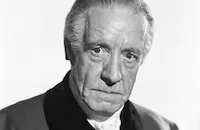Wild Orchids

Brief Synopsis
Cast & Crew
Sidney Franklin
Greta Garbo
Lewis Stone
Nils Asther
Adrian
Marian Ainslee
Film Details
Technical Specs

Synopsis
John and Lili Sterling embark on a second honeymoon combined with a business trip, to Java. On their liner they meet Prince De Gace, a dashing and amorous fellow, who also owns a Java tea plantation. Unaware that the prince has made advances to his wife, John accepts an invitation to be his guest at the estate. On an inspection of the plantations, they are caught in a rainstorm, and the prince agrees to remain at a native hut and protect Mrs. Sterling. John, returning, sees the shadow of a couple embracing and suspects his wife of infidelity. On a tiger hunt, arranged by the prince, his suspicions are confirmed when Lili runs to the side of the wounded prince; he prepares to leave her, but her love for him is ultimately reaffirmed.

Videos
Movie Clip



Film Details
Technical Specs

Articles
Wild Orchids
Garbo plays Lillie Sterling, accompanying her husband John on a business trip to Java. Aboard ship, she witnesses a Javanese aristocrat, Prince De Gace, mercilessly whip a servant and shrinks in horror. Later, the Prince takes advantage of their being alone together to steal a kiss, for which she slaps him. Naturally, she's not pleased when her husband accepts the Prince's invitation to his plantation for a tiger hunt, and once at the estate she does her best to avoid her host. Eventually, however, she succumbs to his exotic charms. When her husband finds out, he arranges to kill De Gace during a nighttime hunt.
Films ranging from The Sheik (1921) to Frank Capra's The Bitter Tea of General Yen (1933) have centered on the dangerous allure of the foreign lover for women of propriety. The subject was ideal for Garbo, who was often seen on screen futilely fighting against her darkest, most forbidden desires. The setting also gave MGM a chance to go all out in production values for its most important star. Once again, they assigned her favorite cameraman, William Daniels, with whom she would make 20 of her 25 American movies. The studio's art department under the direction of Cedric Gibbons placed her in highly stylized settings that relied far more on fantasy than any real image of Java, and costumer Adrian draped the star in a series of Asian-inspired gowns that were more Thai than Javanese. Audiences didn't seem to mind the lack of verisimilitude - it was Garbo in love and that's all that mattered. Actually the film was almost promoted as "Greta Garbo in Heat," the name of the original screen story by John Colton. At the last minute, producers thought better of it and avoided the marketing gaffe by changing the title to Wild Orchids.
In spite of the care lavished on her star vehicle, this was not a happy time for Garbo. During filming she learned of the death of her mentor (and one of the handful of people to get truly close to her) - director Mauritz Stiller. Along with Victor Sjostrom (a.k.a. Seastrom), Stiller was one of the greatest directors of the golden age of Swedish cinema in the silent era. When he was offered work in Hollywood in 1924, he brought along with him his discovery, the young Garbo. The two were practically inseparable, so much so their friends referred to them as Pygmalion and Galatea or Svengali and Trilby. Their fortunes were reversed in America, however, with Garbo groomed for major stardom by MGM while Stiller, often at odds with studio executives, found himself less and less in demand as a director, despite Garbo's insistence that the studio use him. Stricken with a serious respiratory illness, he eventually returned to Europe, not to the clean mountain air of Switzerland as his doctors ordered but to his homeland. He died there in November 1928 at the age of 45. Garbo got the news by cable on the set of Wild Orchids. In the middle of a love scene with co-star Nils Asther, she turned white as a sheet, walked off the set, steadied herself for a few moments, and then returned to finish the scene. Asther recalled hearing hysterical laughter coming from her dressing room later that day. He found Garbo there nearly doubled over holding a very small bottle of brandy and a card from studio boss Louis B. Mayer that read: "Dear Greta, My sympathy in your sorrow. But the show must go on." A few weeks later, Garbo skipped out on the production before retakes were done, heading for Sweden. A furious Mayer put her on suspension without pay, but that didn't stop her from making her first visit home in more than three years. In Stockholm, she went to the room where Stiller's last possessions were being stored. According to StillerÕs lawyer, who accompanied her, she walked somberly around the room, touching various items tenderly, telling a little about each one. That moment may have inspired the scene, years later, in Queen Christina (1933), in which her character takes sad inventory of the bedchamber objects that remind her of her lost love.
Director: Sidney Franklin
Screenplay: Hanns Kraly, Richard Schayer, Willis Goldbeck, from an original screen story by John Colton
Cinematography: William Daniels
Editing: Conrad A. Nervig
Art Direction: Cedric Gibbons
Costume Design: Adrain
Cast: Greta Garbo (Lillie Sterling), Lewis Stone (John Sterling), Nils Asther (Prince De Gace).
BW-100m.
By Rob Nixon

Wild Orchids
Quotes
Trivia
Miscellaneous Notes
Released in United States 1929
Released in United States 1929

















